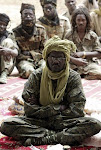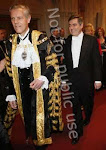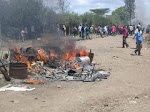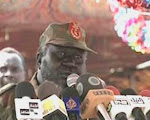In our previous features, "Integral" mentioned – amongst other common causes of disunity in South Sudan – tribalism, nepotism, land grabbing and occupation, greed for government power, tendency to promote lawlessness by deliberately ignoring to establish law and order and lack of interest in embracing democratic principles. It has already looked at land grabbing and occupation. Today, "Integral" will be looking at the forth cause of disunity: greed for government power in South Sudan.
Greed could be defined as excessive desire – "excessive desire for food, wealth, etc." (Collins, 2000:270). A person who secures food for a group of people but tends to take the lion share is a greedy person. Thus, greed for government power in the context of "Integral" means taking the lion share from a government that is supposed to be for the people.
The Comprehensive Peace Agreement (CPA) was negotiated by Sudan People's Liberation Movement and Army (SPLM/A) and the National Congress Party (NCP). The power sharing protocol of the CPA did work out percentages for the country's political parties' shares within the governments at the national, southern and state levels. The CPA distributed these shares in form of percentages as follows: NCP 70 percent and SPLM/A 10 percent in the North. SPLM/A 70 percent and NCP 10 percent in the South. Other political parties in North and South Sudan 20 percent each, (CPA Chapter II, Power Sharing, Part IV, 4.4.2.1& 4.4.2.2.) This is how power was distributed in the Sudan as per the CPA.
Given the percentages above, there is obviously no doubt that NCP and SPLM/A exercised greed when allocating these percentages. The rationale should have been that the NCP, having represented the people of North Sudan, should have shared the cake's lion share with the Northern Sudanese. In the same negotiations the SPLM/A represented the people of South Sudan and the rationale should have secured the lion share for the people of the South Sudan and not the SPLM/A as a political party.
This kind of percentage distribution, especially in South Sudan should have been seen by the SPLM/A as disuniting rather than uniting factor. Why, especially in South and not the North Sudan? It is because the people of the North have had – over the years – their political synchs developed and controlled in the sense that they cannot fight over who rules or gets what share in power. More so, they have enjoyed political power since independence and most of those who are politically conscious are not poor.
In the South, however, South Sudanese didn't enjoy any government power since the days of the Regional High Executive Council (RHEC). As such government power meant a lot to almost all its nationalities and tribes then as it means to them now. Irrespective of this fact, however, Anyanya fighters didn't have any element of greediness for government power when compared to the SPLM/A today. They negotiated the 1972 Addis Ababa agreement for the people of the South and the rationale of giving power to a non-combatant, Abel Alier, was a testimony to that.
Those who fought in Anyanya movement did not impose themselves over those who did not fight. Instead, they gave more than 30 percent of government power – a percentage which SPLM/A believes is the share of the rest of South Sudanese – to those it believes did not fight the war. Why did they do that? One would obviously speculate a number of reasons.
The first one of these reasons is that, it seemed that the Anyanya fighters wholeheartedly wanted to demonstrate to the people of South Sudan that they were fighting for them and not for themselves and government power. The second reason is that, the Anyanya fighters likely understood that running a government is not like fighting the war and as such it felt like it should utilize those from within the government-controlled areas who worked in the government system to work in the RHEC. The last and most important reason is that, it seemed like they were aiming at achieving the highest level of unity in South Sudan by being careful not to step on anyone's toes.
This spirit was not seen in the SPLM/A when they came home as a result of the CPA. The first thing SPLM/A had to do was leave a power vacuum by shutting down the Coordinating Council for South Sudan (CCSS) before forming the GoSS, firing governors, states ministers, commissioners and government advisors before appointing new ones; and closing parliaments in the ten South Sudan States before appointing new members. As a result of this a power vacuum of more than six months was unnecessarily created in South Sudan. South Sudan at states level was left at the mercy of its governments' secretaries headed by what they called States' Supervisors. The real reason for this action was believed to be connected to hate and dislike for those who did not fight the war.
When GoSS was formed, SPLM/A moved in and replaced the most experienced manpower with some of the most educated but certainly inexperienced personnel in government system. They discouraged fellow South Sudanese from living with them in the South, saying: 'you're either with us or against us'. In the South a person has to be an SPLM/A in order to get a job. They innocently implicated fellow brothers – some of whom have languished in SPLM/A jails for more than two-three years – for refusing to join them. In a nutshell, SPLM/A favoured its own cadres and either ignored or detained those others who are not members of the SPLM/A.
Rationale again would have it that the entire staff of the CCSS, except its ministers, should have been maintained. Those, whom the SPLM/A desired should take over from the undersecretaries and other directors should have been given at least six months, may be a year, to train the incoming undersecretaries and directors. But to completely remove experienced non-combatants from public offices and replace them with inexperienced SPLM/A cadres – some of whom have not even worked in government and hence enjoy no experience whatsoever – is as unfair as it is greedily disuniting the people of South Sudan.
The CPA shares in governments that brought all the political parties in the Sudan into partnership will end in 2009. The general election scheduled for 2009 will usher in a new era in which parties will develop coalitions with each other to achieve a simple majority in order to control the executive at the national, southern and states' levels and houses at the national, southern and states' levels in the Sudan. The question is: how would other parties in the South feel about the SPLM/A and the opposite is certainly true in the North?
Greedy politicians have not helped any state(s) in our glob to prosper. Greedy politicians all over the world are destructive because of their corrupt nature. They lead a solitary and isolative life. They cannot contribute to the welfare of communities that elect them let alone their state(s). They have proven to be greedy for power, racially motivated with all their words and actions only to gather support to continue in power. There is no such thing as having the people in mind. Rather it is only their political survival in their thoughts. (http://www.malaysiakini.com/news/85670).
SPLM/A fought for deliverance of the people of Sudan from all evils of the past. But seeing what is happening today, especially the manner in which the liberator (SPLM/A) is seen more often than not behaving like an oppressor in the South; South Sudanese may be far from unity. It should be the liberator who should tirelessly work to unite the people of the South in particular and the Sudan in general but not to insist on following the ways that are likely to disunite the people like greed for government power. Deliverance of a people cannot be achieved in the absence of their unity. Unity should really mean nothing but the final results of deliverance, since deliverance – as we all know – means leave from every evil. The biggest of every evil is the disunity of a people.
GoSS, led by H.E. 1st-Lt-Gen. Salva Kiir Mayardit, the First Vice-President of the Republic, has some time at its disposal to manipulate in the interest of fighting greed within the SPLM/A to achieve a higher level of unity in South Sudan. It is important to isolate the SPLM/A from being synonymous with GoSS. SPLM/A is a political party which enjoys support from a good number of South Sudanese and Sudanese in general but not all of them. GoSS on the other hand is a government for every South Sudanese irrespective of which party s/he comes from. "Integral" is not saying anything new but what everybody in SPLM/A and GoSS knows but unable to accept that they are separable. Continued maintenance of greediness by the SPLM/A within GoSS breeds dislike and hate amongst people of a common destiny and that will not help the unity of South Sudanese.
A few questions are important to ask in the conclusion of this topic: what will happen if SPLM/A fails to win an absolute majority in South Sudan during 2009 elections and loses government power? Will it be wise to say that, SPLM/A has failed the elections and so the party that comes to power must greedily fire every SPLM/A member within the civil service? Or must SPLM/A fight tooth and nail to maintain the status-quo even if it fails the elections? Shall the people of South Sudan then achieve their desired unity of purpose?
Thursday, July 24, 2008
Disunity in South Sudan V
Subscribe to:
Post Comments (Atom)







No comments:
Post a Comment